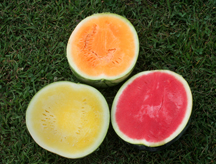Watermelon shown to boost heart health, control weight gain in mice
October 2, 2012
 |
|
A Purdue University and
University of Kentucky study found that mice fed a diet including watermelon
juice had lower weight, cholesterol and arterial plaque than a control group. (Purdue
University photo/Shubin Saha) |
WEST LAFAYETTE, Ind. – Eating an apple a day may keep the doctor away, but eating watermelon may just keep the cardiologist at bay.
A study from Purdue University and University of Kentucky showed that mice fed a diet including watermelon juice had lower weight, cholesterol and arterial plaque than a control group. The findings, reported in the Journal of Nutritional Biochemistry, suggest that citrulline, a compound found in watermelon, plays a role in cardiovascular health.
"We were interested in citrulline because previous studies showed that it may lower blood pressure," said Shubin Saha, a Purdue Extension vegetable specialist and study co-author. "We didn't see a lowering of blood pressure, but these other changes are promising."
The researchers fed two groups of mice diets high in saturated fat and cholesterol. Half the mice received water containing 2 percent watermelon juice, while the others received the same amount of water supplemented with a solution that matched the carbohydrate content of the watermelon juice.
The mice that consumed watermelon juice gained about 30 percent less weight than the control group and had about 50 percent less LDL cholesterol - the so-called bad cholesterol. The experimental group also had about a 50 percent reduction in plaque in their arteries, as well as elevated levels of citrulline.
"We know that watermelon is good for health because it contains citrulline," said Sibu Saha, a professor of surgery at the University of Kentucky. "We don't know yet at what molecular level it's working, and that's the next step."
 |
|
Shubin Saha |
The scientists are interested in finding a secondary market for watermelons in nutraceuticals, which are foods or food components that also offer health benefits. Shubin Saha said that about 20 percent of each year's watermelon crop is wasted either because the fruit is visibly unappealing to consumers or because some growers find it too expensive to pay for harvesting as prices drop during the height of watermelon season.
"We could use the wasted melons that can't go to market for extracting beneficial compounds," Shubin Saha said. "Growers are putting energy into these crops, so if we can do something to help them market their additional product, that would be a benefit to the industry and consumers."
Shubin Saha said he would continue to look at how concentrations of citrulline and lycopene, another compound found in watermelon, affect health. He will also test other varieties to determine whether particular watermelons have more health benefits.
The National Institutes of Health, through the University of Kentucky's Center for Biomedical Excellence In Obesity and Cardiovascular Disease, funded the study. Watermelons were provided by Milne Fruits Products Inc.
Writer: Brian Wallheimer, 765-496-2050, bwallhei@purdue.edu
Sources: Shubin Saha, 812-886-0198, ssaha@purdue.edu
Sibu Saha, 859-257-8250, ssaha2@email.uky.edu
ABSTRACT
Citrullus lantus 'Sentinel' (watermelon) Extract Reduces Atherosclerosis in LDL Receptor Deficient Mice
Aruna Poduri, Debra L. Rateri, Shubin K. Saha, Sibu Saha, Alan Daugherty
Watermelon (Citrullus lanatus or C. lanatus) has many potentially bioactive compounds including citrulline, which may influence atherosclerosis. In this study, we determined the effects of C. lanatus, provided as an extract of the cultivar "sentinel," on hypercholesterolemia-induced atherosclerosis in mice. Male low-density lipoprotein receptor-deficient mice at 8 weeks old were given either C. lanatus "sentinel" extract (2% vol/vol; n= 10) or a mixture of matching carbohydrates (2% vol/ vol; n=8) as the control in drinking water while being fed a saturated fat-enriched diet for 12 weeks ad libitum. Mice consuming C. lanatus "sentinel" extract had significantly increased plasma citrulline concentrations. Systolic blood pressure was comparable between the two groups. Consumption of C. lanatus "sentinel" extract led to lower body weight and fat mass without influencing lean mass. There were no differences in food and water intake and in urine output between the two groups. C. lanatus "sentinel" extract administration decreased plasma cholesterol concentrations that were attributed to reductions of intermediate-/low-density lipoprotein cholesterol. Plasma concentrations of monocyte chemoattractant protein-1 and interferon-gamma were decreased and those of interleukin-10 were increased in mice consuming C. lanatus "sentinel" extract. Intake of C. lanatus "sentinel" extract resulted in reductions of atherosclerosis in both aortic arch and thoracic regions. In conclusion, consumption of C. lanatus "sentinel" extract led to reduced body weight gain, decreased plasma cholesterol concentrations, improved homeostasis of pro- and anti-inflammatory cytokines, and attenuated development of atherosclerosis without affecting systolic blood pressure in hypercholesterolemic mice.
Ag Communications: (765) 494-2722;
Keith Robinson, robins89@purdue.edu
Agriculture News Page

